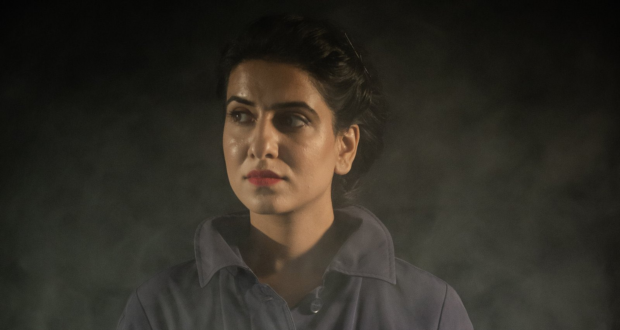This biography of an unlikely hero of World War II will tell you a lot of facts but fatally fails to get anywhere near the heart of its remarkable subject. Summary
Rating
Ok
I approached Noor with a sense of excitement. Aware, surely, that World War Two comes with a huge amount of cultural baggage Kali Theatre, who work with female and non-binary writers of South Asian origin, would bring us something new and radical, no?
The answer, friends, is sadly a flat no. Writer Azma Dar’s dense text, clearly dominated by her research into spy Noor Inayat Khan’s life, certainly rattles on. However, anyone looking for surprises, insights or depth is likely to be disappointed. Why? The blame, I fear, lies squarely with some of the most clichéd writing and characterisation I’ve seen staged anywhere. The low point is hearing a German prisoner of war claiming he was – yep, you guessed it – only following orders.
Director Poonam Brah at least marshals her hard-working cast around a neatly designed traverse set with imagination. Only an eccentric bit of physical theatre when, I think, we were supposed to believe a gas mask briefly became an elephant’s trunk feels like a misstep. The rest, mercifully, keeps us engaged. The problem is the writing makes it difficult to care. Dar’s consistently clunky phrasing makes the actors work doubly hard with little reward. It is far too fact-based and expositional to get under anyone’s skin. Noor’s thoughts on her Indian heritage and the prospect of national independence, for example, should have been a fascinating aspect of her character. As it is, they are shoe-horned into one short speech that has the subtlety and nuance of a PowerPoint slide.
This on-the-nose trend continues as we experience British and German officers barking at each other about the morality of war. Chris Porter, as German Kieffer, has a good stab at being complex and conflicted. As he argued, though, this reviewer felt increasingly uncomfortable. Rather than yet more Nazis, shouldn’t we be giving stage time to a woman the Nazis imprisoned and killed? At least Caroline Faber, playing British officer Atkins as an equally tortured soul, is on the right side of history. Their exchanges, however, rapidly become forced, overwrought and shouty. It is never clear why. This isn’t meant to be their story, is it?
Laurence Saunders deserves credit for doubling roles. His understated performances as a bumbling British officer, Buckmaster, and a French resistance old hand known as The Professor are strongly differentiated. Thanks to his skills, shaving the cast size down by one is largely unnoticed. Ellie Turner plays local friend-of-the-resistance, Renee. If the ghost of ‘Allo ‘Allo haunts her early scenes it’s because her dialogue is ridiculously thin. Makeup and men! I mean what else would women talk about during the war? I shan’t give a plot spoiler away, but the fact her character is underexplored feels criminally wasteful.
As the lead, Annice Bopari excels at wide-eyed innocence. This is delightful as she sets off on her adventure. She is harder to believe as an established agent operating behind enemy lines. Her performance remains resolutely whimsical when perhaps she needs to throw a few more believable punches. Only at the last, when we see her shot at the Dachau concentration camp, did the reality of her character’s bravery hit home. This is, however, undercut with cheesy and unnecessary nods to the afterlife accompanied by mystical soundscapes – a token reference to Noor’s Sufi Muslim faith no doubt.
Noor Inayat Khan is undeniably a hero. It is right her name is in lights this Remembrance season. I just wish I knew her. Sadly, this production didn’t help with that at all.
Written by: Azma Dar
Directed by: Poonam Brah
Designed by: Helen Coyston
Lighting Design by: Neill Brinkworth
Sound Design by: Dinah Mullen
Movement Director: Nancy Kettle
Assistant Director: Neetu Singh
Production Manager: Alex Ralls
Noor plays at Southwark Playhouse until 26 November. Further information and bookings can be found here.
 Everything Theatre Reviews, interviews and news for theatre lovers, London and beyond
Everything Theatre Reviews, interviews and news for theatre lovers, London and beyond



